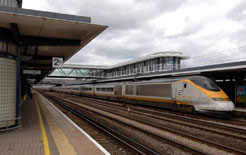LOCAL businesses want a nationwide package of transport changes from the next government.
The prioritisation of 13 crucial transport projects over the life of the next Parliament – 12 regional and one national – would bring the UK economic benefits worth a massive £85 billion, says the British Chambers of Commerce (BCC), which represents over 100,000 businesses.
These UK businesses have highlighted the key transport projects they believe are crucial to successfully growing regional economies. The projects include:
- London – Crossrail: Cost £15.9bn l Benefit: £36bn
- South East – M20 Operation Stack: Cost: £48m l Benefit: £75m
- South West – A303/A358 Improvement: Cost: £184m l Benefit: £1.1bn
- East of England – A14 Ellington to Fen Ditton Scheme: Cost: £765m l Benefit: £2bn
- East Mids – A453 widening (M1 J24 to A52 Nottingham): Cost: £98m l Benefit: £320m
- West Mids – Birmingham Motorway Box: Cost: £149m l Benefit: £399m
- Wales – M4 Relief Road: Cost: £478m l Benefit: £2.1bn
- Yorkshire and the Humber – East Coast Mainline: Cost: £606m l Benefit: £1.7bn
- North West – Manchester Hub: Cost: £937m l Benefit: £3.7bn
- North East – A19 junction upgrades: Cost: £171m l Benefit: £707m
- Scotland – Forth Replacement Bridge: Cost: £1.4bn l Benefit: £6bn
- Northern Ireland – M1/Westlink: Cost: £46m l Benefit: £201m
- National – 3rd Runway at Heathrow: Cost: £9bn l Benefit: £30.7bn
The BCC said it recognised the pressure on the public finances, and the need for spending cuts to bring down the UK’s huge budget deficit, but it said that this powerful package of road, rail and airport improvements must be delivered over the next decade, with both the funding and political will to construct them guaranteed.
These projects are critical alongside high-speed rail, which cannot be the only transport improvement ‘green-lighted’ by all the major political parties over the next five years.
David Frost, director general of the British Chambers of Commerce, commented: “Transport infrastructure cuts must not become a politically convenient way to slash spending after an election, especially when there are huge savings to be made in far larger budgets, including health, education and welfare.”
Mr Frost continued: “A government focused on the UK’s future economic success must do everything it can to protect investment in priority transport projects.These infrastructure improvements will not only unlock much needed economic growth, but will also help the hard-pressed UK construction sector and local businesses in the supply chain.
“Public resources are constrained, of course we understand that, but cutting or scrapping plans for regional transport improvements means fewer jobs, and ultimately fewer businesses driving recovery,” he added.
The total cost of building these projects would be £29.8 billion said the BCC – with private sector costs of £14.3bn and public sector costs of £3.1bn per year over a five year period, which compared to an average annual transport spend of around £10bn.
David Begg, chairman of the Business Infrastructure Commission, added: “Improving our regional transport links goes hand in hand with economic growth and job creation.”








